Although intercity buses provide a crucial service to millions of Americans, the industry has been shut out of recent pandemic assistance programs while riders continue to experience dismal facilities and shrinking service options.

Despite serving twice as many customers as Amtrak, intercity bus service did not receive direct aid during the pandemic from either the CARES Act or the American Rescue Act, writes Jake Blumgart. "For tens of millions of Americans, intercity bus companies like Greyhound, Megabus, and myriad smaller actors are an essential part of the nation’s transportation system." These services "have long served as a lifeline to areas without train or plane service, and for riders who don’t have access to a car. It is an essential service for rural America, for students, and for low-income people."
Because bus travel primarily serves disadvantaged groups, "advocates say that further federal aid should be extended to their mode of travel, as it was for so many others earlier in the pandemic. Failing that, local and, especially, state policymakers could help to fill the gap."
Unlike other transportation industries, the deregulation of intercity bus travel in the 1980s "did not spur a surge of new entrants or innovation. Instead, Greyhound gobbled up many of its big competitors while downsizing its operations" before going bankrupt in 1990. "Today, very few operators are stopping on the side of a country road. Although Greyhound is still the largest motorcoach company, it is a shadow of its former self and the newer competitors that finally started to emerge in the 2000s were largely non-union."
This year, as the Delta variant started to spread, only roughly 60 percent of riders have returned to intercity buses, and the companies are still struggling to rebuild. Blumgart argues that "[t]he industry never saw the public intervention that surrounds rail and airline travel because, for the most part, both its riders and its operators are unheard in policy circles." But even in the absence of federal aid, "[b]us advocates say that local officials can ensure riders have access to decent facilities," such as accommodations beyond city sidewalks or parking lots with no shelter from the elements.
FULL STORY: Intercity Bus Service Gets No Respect from Government

Analysis: Cybertruck Fatality Rate Far Exceeds That of Ford Pinto
The Tesla Cybertruck was recalled seven times last year.

National Parks Layoffs Will Cause Communities to Lose Billions
Thousands of essential park workers were laid off this week, just before the busy spring break season.

Retro-silient?: America’s First “Eco-burb,” The Woodlands Turns 50
A master-planned community north of Houston offers lessons on green infrastructure and resilient design, but falls short of its founder’s lofty affordability and walkability goals.

Test News Post 1
This is a summary

Analysis: Cybertruck Fatality Rate Far Exceeds That of Ford Pinto
The Tesla Cybertruck was recalled seven times last year.

Test News Headline 46
Test for the image on the front page.
Urban Design for Planners 1: Software Tools
This six-course series explores essential urban design concepts using open source software and equips planners with the tools they need to participate fully in the urban design process.
Planning for Universal Design
Learn the tools for implementing Universal Design in planning regulations.
EMC Planning Group, Inc.
Planetizen
Planetizen
Mpact (formerly Rail~Volution)
Great Falls Development Authority, Inc.
HUDs Office of Policy Development and Research
NYU Wagner Graduate School of Public Service



























